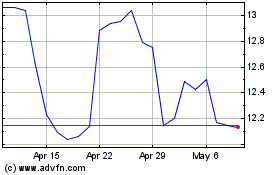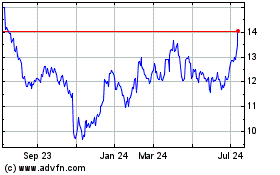GM to Kill Chevrolet Sonic Subcompact Car -- Update
April 04 2018 - 11:01AM
Dow Jones News
By Mike Colias and Christina Rogers
General Motors Co. will end production of the Chevrolet Sonic
subcompact car as early as this year, according to people familiar
with the matter, part of a broader push by Detroit auto executives
to abandon low-margin cars in favor of sport-utility vehicles.
Long thought to be necessary for combating Japanese rivals and
catering to budget-minded or young customers, passenger cars have
fallen out of favor amid low gasoline prices and efficiency
improvements in SUVs. With the Trump administration planning to
roll back fuel-economy standards, other domestic nameplates will
likely join the Sonic in the scrapheap.
GM, for instance, is also considering discontinuing the Chevy
Impala large car in the next few years, these people said, a
decision that would kill a 61-year-old car line. Ford Motor Co.,
meanwhile, plans to stop building the Fiesta small car for the U.S.
market within the next year, and discontinue the Taurus large
sedan, according to people briefed on the plans.
Executives are still considering the future of the
bread-and-butter Ford Fusion, once billed as an answer to the Honda
Accord or Toyota Camry, these people said.
The strategy is lucrative but risky.
While U.S. auto makers have long earned the bulk of their
profits from pickup trucks and SUVs, GM, Ford and Chrysler have
suffered when gasoline prices spike and dealers are left with a
stale or limited selection of fuel-efficient offerings. Toyota
Motor Corp., Nissan Motor Co. and Honda Motor Co. have laid out
investments to keep vehicles such as the Civic and Altima fresh
even as demand wanes.
GM will continue to sell a smaller collection of passenger cars,
including a compact Chevy built in Ohio and an electric car built
in the Michigan factory that also assembles the Sonic. Ford and
Fiat Chrysler Automobiles NV, meanwhile, are considering far more
aggressive pullbacks from passenger cars due to the success of Jeep
or the F-150 truck.
Fiat Chrysler took the first step in killing off small cars,
discontinuing the 200 sedan and Dart compact a few years ago to
free up money for pickup and SUV production. The auto maker is now
reporting record profits and may be considering an end to larger
cars, including the Chrysler 300 and Dodge Charger, within a few
years.
The death of the Sonic is as symbolic as it is strategic. The
car went on sale in 2011, and it was heralded as a hit due to its
features, which included heated seats and other extras not seen on
cheap small cars. Chevy sold nearly 100,000 Sonics in 2014, far
more than previous models, but deliveries dwindled to about 30,000
last year.
The Sonic is built at the Orion Assembly plant in suburban
Detroit, which was saved from closure during GM's 2009 bankruptcy
through a $1 billion lifeline of grants and tax incentives from the
state of Michigan, local municipalities and the federal government.
Seen as a small-car plant preserved largely by the Obama
administration, it was refurbished to represent the Motor City's
renewed commitment to small and efficient automobiles.
The plant, however, produces about one-quarter the number of
vehicles that one of GM's busy truck factories make.
GM laid off thousands of factory workers last year as it
scrambled to adjust car production with lower-than-expected
demand.
The company sees consumer preference for SUVs over cars as
"largely permanent" and is assessing "how we best deploy assets in
critical passenger-car segments to ensure we're getting a return,"
GM finance chief Chuck Stevens told analysts last year.
Ford is also shifting. It recently put on sale the EcoSport
small crossover SUV in the U.S. at a starting price of $20,000 --
almost $6,000 more than the Fiesta with which it shares an
underbody.
"The EcoSport is basically the same vehicle and they can charge
several thousand dollars more for it," said George Waikem II, who
manages Nissan, Kia and Ford dealerships in northeast Ohio. Small
cars, like the Fiesta, he said, are "definitely on an island that
is sinking."
Sedans, coupes and other car categories accounted for 37% of
U.S. sales last year, down from 51% in 2012. This has executives
even outside Detroit considering how to respond.
It is a consumer shift "we really haven't seen before," Toyota
U.S. sales chief Bill Fay said at an industry conference in New
York last week. Another Toyota executive forecast the sale of cars
shrinking to 30% of the market in the near future, and said the
Japanese auto maker may need to expand its SUV lineup.
--Chester Dawson contributed to this article.
Write to Mike Colias at Mike.Colias@wsj.com and Christina Rogers
at christina.rogers@wsj.com
(END) Dow Jones Newswires
April 04, 2018 10:46 ET (14:46 GMT)
Copyright (c) 2018 Dow Jones & Company, Inc.
Ford Motor (NYSE:F)
Historical Stock Chart
From Mar 2024 to Apr 2024

Ford Motor (NYSE:F)
Historical Stock Chart
From Apr 2023 to Apr 2024
